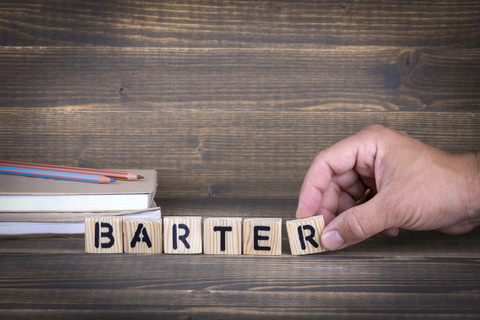 Some businesses like to swap their goods and services with other companies. In fact, according to Barter News Weekly, nearly one-third of small businesses in the U.S. and 65% of corporations listed on the NYSE use bartering. These transactions minimize cash flow concerns and enable businesses to get what they need and dispose of what they don’t without using up cash. In fact, famed British economist John Maynard Keynes said a century ago: “With the breakdown of money economy the practice of international barter is becoming prevalent.” While these may be compelling reasons to consider barter, there are tax issues to think about when doing trades, swaps, or exchanges.
Some businesses like to swap their goods and services with other companies. In fact, according to Barter News Weekly, nearly one-third of small businesses in the U.S. and 65% of corporations listed on the NYSE use bartering. These transactions minimize cash flow concerns and enable businesses to get what they need and dispose of what they don’t without using up cash. In fact, famed British economist John Maynard Keynes said a century ago: “With the breakdown of money economy the practice of international barter is becoming prevalent.” While these may be compelling reasons to consider barter, there are tax issues to think about when doing trades, swaps, or exchanges.
Bartering is a taxable event
Even though money doesn’t change hands, when you swap your business’s goods and services the transactions are still taxable. This is so whether the bartering is one-on-one or through a barter exchange. The IRS gives this example: A self-employed accountant does the books and files returns on behalf of a house painter who paints the accountant’s home. Each must report the fair market value of the services that they agree upon (essentially what each would charge anyone else, including any discounts).
If you barter through an exchange, the transactions are reportable to you and to the IRS on Form 1099-B. This reporting is excused only if there are fewer than 100 transactions per year or under $1 in value. But the exchange may choose to report transactions nonetheless.
Bartering has tax responsibilities
In addition to including the value of bartering in your income for federal and, where applicable, state and local income taxes, there are other tax responsibilities.
- Information reporting. When you barter with someone in business for services valued at $600 or more, you have to issue Form 1099-MISC to report the “payments” to them.
- Sales taxes. Some states, such as California, New York, and Texas, require sales tax on barter transactions to be collected and remitted.
Trading property
If you swap real property for other real property viewed as “like kind,” your gain on the exchange is tax deferred (even though it’s often referred to as a tax-free exchange). The gain not reported is preserved in the basis of the new property and reportable when the new property is later sold in a taxable transaction. Real property means land in the U.S. or anything built on it and which you hold for investment or in your business. The IRS gives this example: You trade an apartment building in Detroit for unimproved land in Dallas. This is a like-kind exchange. Special rules apply when cash or other types of property trade hands during the exchange (see IRS Publication 544).
However, if you swap any other type of property now, you can’t defer the tax on your gain. For example, if you trade in your old business vehicle for a new one, you are taxed on the gain from your old vehicle.
Final thought
Talk with your CPA or other tax adviser if you’re thinking about bartering, trading, or exchanging any goods, services, or property.


